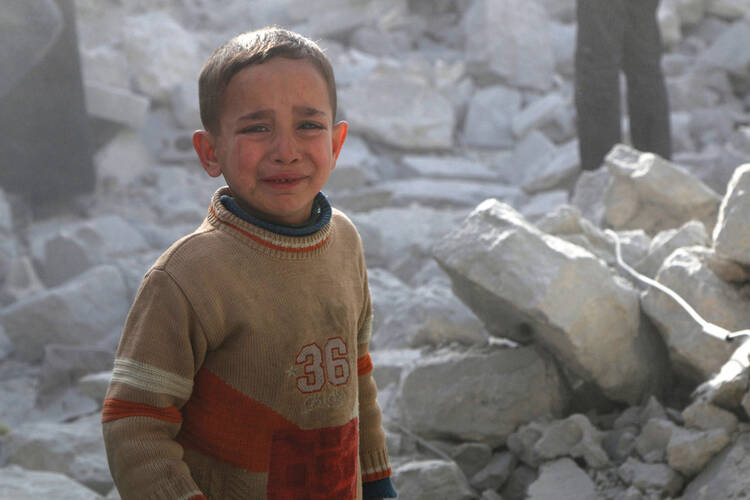As the devastating conflict in Syria began its fourth year on March 15, the Catholic bishops of Syria called for a cease-fire and for combatants to return to negotiations in Geneva to end the suffering in the war-torn country. The bishops encouraged the faithful during Lent, to “fast and show solidarity, charity and collaboration in alleviating the sufferings of internally and externally displaced persons.”
In a statement following its spring session, the Assembly of the Catholic Hierarchy of Syria said: “We declare our rejection of all forms of extremism...murder and extortion and all attacks on people and buildings. We condemn attacks on places of worship, whether churches or mosques.
“We support all efforts toward a peaceful, just and rapid solution to the crisis, especially through a continuance of the Geneva talks,” the bishops said. “We want a united, free, democratic and pluralistic Syria, with the same citizenship criteria for everyone, and we want a worthy life for all constituents of Syrian society, irrespective of party.” Because of difficult travel conditions inside Syria, the meeting on March 12 was held at the Melkite Catholic patriarchal residence in Rabweh, Lebanon.
The Jesuit Refugee Services said the human fallout from the Syrian conflict represents the biggest humanitarian crisis of our times. It warned that in recent months the situation for noncombatants had badly deteriorated as violence intensified and fighting continued throughout the country. According to the United Nations, the number of Syrians in need of humanitarian assistance has risen dramatically to 9.3 million people, up from 6.8 million in June 2013. Similarly, the number of people displaced within the country has increased to more than 6.5 million from 4.25 million.
Every day of violence adds to this number and leaves increasing numbers of civilians under siege. Three million people are now trapped in hard-to-reach or besieged areas, with an estimated 250,000 people cut off from assistance for more than a year. More than 140,000 people have been killed in three years of fighting. Lack of protection marks the conflict, J.R.S. says, with troubling reports of abuse against women and children, including rape.
“I find the most stressful thing is that when you leave the house in the morning, you don’t know if you’ll ever see the others again. We can’t go out at night; we are always trapped inside. It’s suffocating,” said a Jesuit Refugee Service volunteer in Syria.
“After so much continuing violence, Syrians are really tired—frustrated and tired. We need those fighting each other to recall the existence of a minimum of human ethics and respect for basic humanity,” said Nawras Sammour, S.J., the J.R.S. Middle East director, during a recent trip to the United States. “We feel abandoned.”
“We appeal to all citizens, asking them to work for peace by all means, both local and international, and emphasize the need for a cease-fire, dialogue, reconciliation and reconstruction,” Syria’s bishops said at the conclusion of their conference. “We all have the responsibility of working hard for peace,” they said. “We appeal to the conscience of all nations, and especially those countries capable of playing a decisive role in the Syrian crisis, to find a way to end the crisis.
“We beseech the Lord to lead our tragic, bloody way of the cross toward the dawn and joy of the holy Resurrection,” the bishops add. “Let Syria return to its former state of peace, security, love, kindliness, communication, fellowship, mutual respect, living together and a worthy life for all citizens.”








